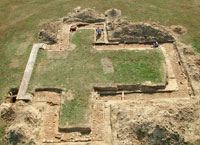Before Digging Begins

Chapel foundations exposed through archaeology.
Every archaeological project involves planning prior to excavation. Including a conservator in the early stages will save time and money and insure objects are not damaged during removal. Knowledge of the site, its materials and the expected condition of artifacts will help the conservator plan treatment during and after excavation
In the Fall of 1992, a multi-disciplinary team that included archaeologists, archaeological conservators, forensic anthropologists, geophysicists, nuclear physicists, engineers, pollen analysts, and atmospheric scientists assembled in St. Mary’s City, Maryland. Timothy B. Riordan and Henry M. Miller served as project directors. The common goal of the team was to recover these unique coffins while preserving their contents so as to answer as many research questions as possible. Within was valuable information about the colonial inhabitants of St. Mary’s City and their society and environment.
![In 1991, archaeological excavations at the site of the brick chapel [18 ST1-103] discovered three lead coffins. A plan for conservation was established before the excavations began.](http://oldsite.hsmcdigshistory.org/wp-content/uploads/2013/09/c-fig-1-excavatons.jpg)
In 1991, archaeological excavations at the site of the brick chapel [18 ST1-103] discovered three lead coffins. A plan for conservation was established before the excavations began.


